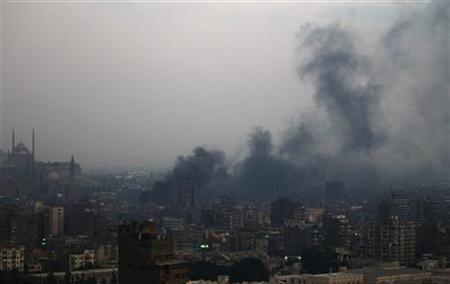
A Forbes-cited study, claiming Cairo is the most polluted city on Earth, was refuted in a Sunday statement by Egypt’s Ministry of Environment.
Through Facebook, the ministry asserted that the study by Eco Experts – which makes use of the Mimi Hearing Index, lightpollution.info and World Health Organization (WHO) statistics – was unclear in its sources and adopted a flawed methodology.
The ministry claimed that in order to actually measure air pollution, there is a “certain process” one has to follow, which only the ministry is authorized to carry out, and is only attainable by the National Network for Monitoring Ambient Air Pollutants.
It pointed out that the ministry was not cited in any of the Eco Experts’ data, despite being the only lawful entity to refer to for information.
The ministry also denounced what it saw as selective use of the WHO’s data by the Eco Experts. The WHO (whose own report ranked Cairo second in pollution) had specified six factors in air quality: suspended solid particles, sulfur dioxide gas, nitrogen dioxide gas, carbon monoxide, ozone gas and lead.
Meanwhile, the Eco Experts study exclusively used data on suspended solid particles, without mentioning how Cairo fared on the rest of the measurements.
Further, the ministry’s own measurements of suspended solid particles “directly clashed” with the WHO’s data. Where the Eco Experts study cites the WHO’s measurement of 284 micrograms per square meter, the ministry reports its own measurement of suspended solid particles at 127 micrograms per square meter.
Although a ministry report from 2017 did observe “some breaches” in the yearly average of solid particles of a less than 10 micrometer area, the report indicated a 70 percent rate of commitment to “legal numbers” through the year.
The ministry also highlighted that roughly 50 percent of the extra particles were “concentrated in deserted areas”.
It then argued that the environmental status of a country was in fact determined through several factors, which is how the reputable Environmental Performance Index (EPI) is measured. The EPI is a collaboration of Yale University, Columbia University and the World Economic Forum.
The ministry pointed out that Egypt actually climbed on the list, from 104th out of 180 countries in 2016, to 44th in 2017.
However, the EPI itself is not intended as a ranking of pollution, but environmental considerations as a whole. It covers performance in 24 aspects of 10 environmental issues: quality of air, quality of water, heavy metals, agriculture, forests, hunting, biological diversity, water resources as well as climate change and energy.
Nevertheless, the ministry added that improving air quality was one of the main goals of its 2030 strategy, which aims to reduce solid particles of less than 10 micrometer diameter by 50 percent by 2030.
According to the National Network for Monitoring Air Pollutants, the government can claim a particle reduction rate of 19 percent in 2017.
The number was reportedly achieved through government programs that focused on controlling factory pollution, and empowering companies to be more in control of their emissions, while trying to create alternative energy outlets. The government also cited work on public transportation, increased energy use efficiency, and increased recycling rates.
Finally, the ministry attacked Eco Experts’ use of the Mimi Hearing Index for noise pollution, claiming again that it contradicts the Egyptian government’s measurement of noise pollution, which it reportedly conducted through 30 stations.
The ministry claimed that the study shows “inaccuracy” regarding noise, as it does not take into account Cairo’s congestion, constant commercial activity until late hours, as well as traffic, which all contribute to noise – as opposed to cities that close early.
On Saturday, Forbes published an article citing a months-old study by the Eco Experts on worldwide pollution. The study compares levels of pollution in 48 cities scattered across 24 countries, by aggregating air, noise and light pollution.
Cairo scored the highest in total, followed by Delhi, Beijing, Moscow, Istanbul, Guangzhou, Shanghai, Buenos Aires, Paris and Los Angeles.
“The city also has the 2nd highest levels of PM10 in the world, at 284 ug/m3 on average – 14.2 times over the safe limit,” reads the study.
The study goes on to note Cairo as the third-noisiest city in the world, behind Guangzhou and Delhi. It notes an earlier study by the Egyptian National Research Center, which claims that noise in the city reaches an average of 85 decibels everyday. Eco Experts likens the number to spending all day inside a factory.
As for light pollution, the study lists Cairo as the third brightest city in the world, trailing behind Moscow and Chicago.
Air pollution data was taken from the World Health Organisation’s (WHO) ambient, outdoor air quality database for each city. Light research relied on the website lightpollution.info, while the noise levels were determined from the Mimi Hearing Index, which rank a city’s noise on an increasing scale of 0-2.




